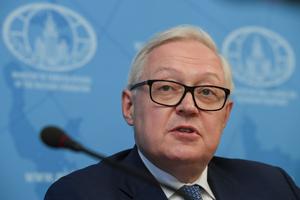 In this file photo, Russian deputy foreign minister Sergei Ryabkov gives a press conference on the 1987 Intermediate-Range Nuclear Forces (INF) treaty in Moscow on August 5, 2019. (KIRILL KUDRYAVTSEV / AFP)
In this file photo, Russian deputy foreign minister Sergei Ryabkov gives a press conference on the 1987 Intermediate-Range Nuclear Forces (INF) treaty in Moscow on August 5, 2019. (KIRILL KUDRYAVTSEV / AFP)
WASHINGTON - US Special Presidential Envoy for Arms Control Marshall Billingslea said on Monday that Washington and Moscow had set the date and venue for nuclear arms negotiations this month.
Today agreed with the Russian Deputy Foreign Minister Ryabkov on time and place for nuclear arms negotiations in June.
Marshal Billingslea, US Special Presidential Envoy for Arms Control
"Today agreed with the Russian Deputy Foreign Minister Ryabkov on time and place for nuclear arms negotiations in June," Billingslea said on his Twitter account, without providing detailed information.
ALSO READ: China urges US to honor nuclear test ban treaty
China is also invited for the talks, according to Billingslea's tweet. China, however, has repeatedly reiterated that it has no intention of participating in the so-called trilateral arms control negotiations with the United States and Russia.
Citing a US Department of State official, Bloomberg reported the same day that a new round of arms control talks between the two nuclear superpowers would be held in Vienna on June 22.
ALSO READ: US does not expect to pull out of New START accord
The upcoming meeting will be the first arms control talks between Billingslea and his Russian counterpart, said Bloomberg, suggesting that "the Trump administration has softened its stance on extending New START (New Strategic Arms Reduction Treaty)."
In 2010, Washington and Moscow signed the New START, which stipulates the limits to the numbers of deployed nuclear warheads and strategic delivery systems by both. The New START, the last remaining nuclear arms control treaty in force between the two nuclear superpowers, will expire on Feb 5, 2021.
The agreement can be extended for at most five years with the consent of the two countries. Russia has expressed willingness to extend the treaty, while the Trump administration has yet to officially reply.
READ MORE: Pentagon tests long-banned ballistic missile over Pacific


